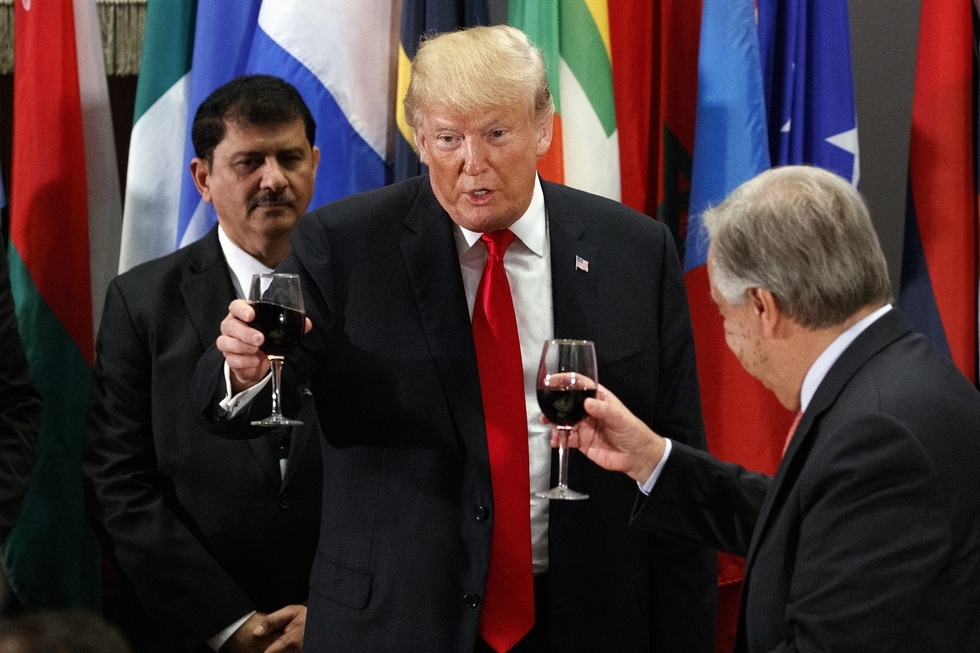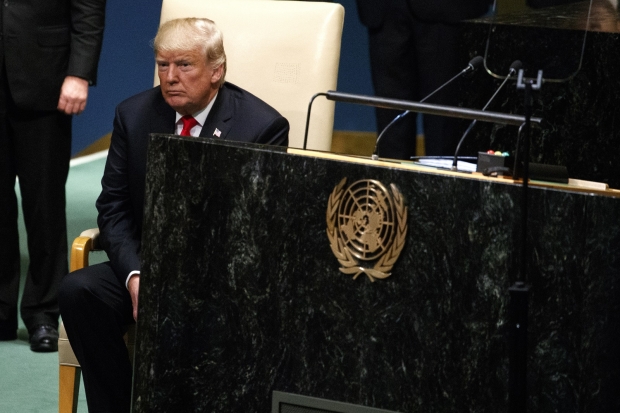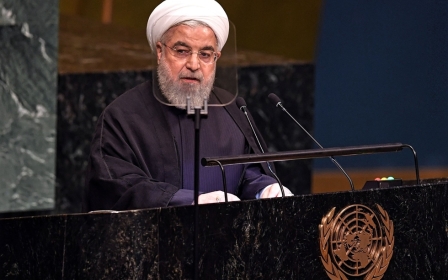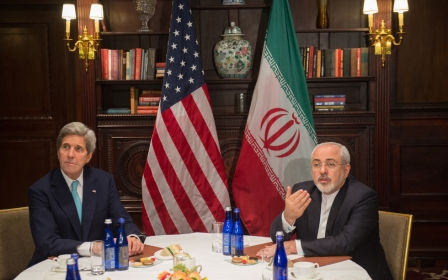Four takeaways from Trump's speech at UN

US President Donald Trump moved away from his usual unscripted speaking style on Tuesday, to outline his policy position and views on the world at the UN General Assembly.
He raged against globalism, promoted nationalism, lauded his own impact on international relations, praised allies and rebuked foes in a speech that lasted over 35 minutes.
Trump did not articulate detailed policy positions on the Israeli-Palestinian conflict, other than defending the internationally-rejected decision to move the US embassy to Jerusalem and saying he is committed to "peace and stability in the region, including peace between the Israelis and the Palestinians".
He overlooked the Gulf crisis between Qatar on one side and Saudi Arabia, the UAE, Egypt and Bahrain on the other, thanking Doha, Riyadh and Abu Dhabi for pledging aid to Syria and Yemen as he put it.
Despite hailing Saudi rulers as reformists, he raged against the oil-producing nations of OPEC for "ripping off the rest of the world".
Here are four other takeaways from his speech.
The Trump doctrine
President George W Bush's foreign policy was shaped by the 9/11 attacks. He waged what he called preventive wars to destroy perceived enemies before they attack the US. He took military action with or without allies, and he emphasised spreading "American values" - namely democracy - in nations at odds with Washington.
Barack Obama's policy was leading from behind in cooperation with European allies and avoiding rash decisions, as he would reportedly privately quip to aides that his doctrine is: "Don’t do stupid shit."
Trump may be less well-versed in global affairs than his predecessor, but on Tuesday at the UN he emphasised the focus of his foreign policy, revealing a doctrine consistent with the behaviour of his administration.
The US president stressed national sovereignty and allowing countries to pursue their own interests.
"America is governed by Americans. We reject the ideology of globalism, and we embrace the doctrine of patriotism," Trump said.
"Around the world, responsible nations must defend against threats to sovereignty not just from global governance, but also from other, new forms of coercion and domination."
Earlier in September, National Security Adviser John Bolton threatened to impose sanctions on the International Criminal Court (ICC), proclaiming it "dead to us".
Trump doubled down in criticism of the ICC on Tuesday.
"As far as America is concerned, the ICC has no jurisdiction, no legitimacy, and no authority... We will never surrender America’s sovereignty to an unelected, unaccountable, global bureaucracy," the US president said.
Ron Stockton, a political science professor at the University of Michigan-Dearborn, said while it is true that Washington has been too involved in other countries' affairs, Trump's position threatens the post-World War II global economic and diplomatic structure that the US itself helped set up.
"He wants to dismantle that whole system. I think this is wrong. There's a lot of stability that came out of that - some problems as well but a lot of stability. Dismantling alliances and trade [agreements] and all sorts of things, this is not going to be good," Stockton told MEE.
Hardline on Iran
Speculations have been swirling about a possible meeting between Trump and Iran's Hassan Rouhani at the UN this week. The White House had expressed willingness to hold negotiations with Tehran, but Iranian leaders have held firm that a US return to the nuclear pact is a prerequisite for future talks.
Before his appearance at the UN, Trump ruled out direct talks with his Iranian counterpart, suggesting that the Iranians are the ones requesting a meeting.
In his speech, Trump reiterated his hardline stance on Tehran, labelling it "the world’s leading sponsor of terrorism".
Despite emphasising states' autonomy over their own affairs, Trump called Iran a "dictatorship" and slammed its leaders for their domestic policies.
"The Iranian people are rightly outraged that their leaders have embezzled billions of dollars from Iran’s treasury, seized valuable portions of the economy, and looted the people’s religious endowments, all to line their own pockets and send their proxies to wage war," he said.
The US president also restated his familiar criticism for the nuclear deal, which he nixed in May. The agreement, signed by Iran and major world powers in 2015, saw Iran drastically scale back its nuclear programme in exchange for lifting economic sanctions.
Trump said on Tuesday that reinstating US sanctions is already paying dividends in exerting "economic pressure to deny the regime the funds it needs to advance its bloody agenda".
In a subtle warning to countries that import oil from Iran, he said: "Additional sanctions will resume November 5th, and more will follow. And we’re working with countries that import Iranian crude oil to cut their purchases substantially."
Stockton said Trump believes that showing opposing parties that he's tough helps bring them to the negotiation table.
"If he's hoping to open up negotiations with Iranians - he's often said that he would be willing to meet them - then that's good, and we should treat this as just a verbal strategic belligerence, designed to open up negotiations. I'm not sure I believe that."
Keep refugees out
While commenting on the war in Syria, Trump praised Jordan's efforts to host refugees. But he absolved the US of responsibility to admit displaced people seeking protection.
The US president, who has drastically reduced his own country's refugee resettlement programme, argued that Syrians displaced by war should remain in neighbouring countries until they can return to their homeland.
"As we see in Jordan, the most compassionate policy is to place refugees as close to their homes as possible, to ease their eventual return to the heart of the rebuilding process," Trump said.
"This approach also stretches finite resources to help more people, increasing the impact of every dollar spent."
Earlier this month, the US State Department announced that it will admit 30,000 refugees in 2019, down from 85,000 in 2016, Obama's last year in office.
Betsy Fisher, the policy director of the International Refugee Assistance Project, said Washington's "continued retreat from leadership in refugee protection" under the Trump administration is outrageous.
"Stepping back from that programme is a pretty strong signal to the rest of the world that the US does not want to lead in human rights and in helping refugees," she told MEE.
Fisher said while host nations in the Middle East, including Jordan, have been "gracious" to Syrian and Palestinian refugees, displaced people need a "durable solution" that would include the ability to raise their children and work legally.
"It's important to note that the US has actually decreased our aid in the region. We are in the process of cutting all of our assistance to the UN agency that assists Palestinian refugees, many of whom are in Jordan, who will now be relying on other international agencies for assistance," Fisher said.
"We can't just say that we want to help refugees stay closer to home without helping the countries and the agencies that are assisting those refugees. We can't both cut aid in the region and then say: 'Our policy is to prefer protection there.'"
The world laughs
Trump opened his remarks at the General Assembly by touting his own record at home - a routine domestic act that was received comically by world leaders.
"In less than two years, my administration has accomplished more than almost any administration in the history of our country. America's so true," Trump said.
His audience, comprised of heads of states and top diplomats, laughed.
The US president chuckled and added: "I did not expect that reaction, but that is ok." The laughter grew louder.
Stockton explained that Trump was addressing his US supporters.
"I thought it was so strange because he was basically speaking to his base, to Americans, to Americans who support Trump," Stockton told MEE. "He talked about his own achievements; he dismissed the previous administration. I thought that was inappropriate and a bit silly, but he's done it before, so I wasn't surprised."
Stockton added that Trump unintentionally outperformed professional stand-up comedians who would fail to get that many laughs in such a short time.
"It was embarrassing. As a patriotic American, I was embarrassed," Stockton said.
Stay informed with MEE's newsletters
Sign up to get the latest alerts, insights and analysis, starting with Turkey Unpacked
Middle East Eye delivers independent and unrivalled coverage and analysis of the Middle East, North Africa and beyond. To learn more about republishing this content and the associated fees, please fill out this form. More about MEE can be found here.





